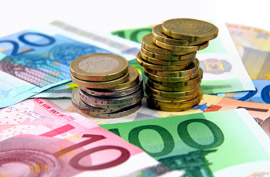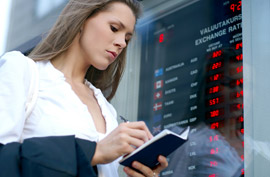 Between commissions, credit card surcharges, ATM fees and other expenses, you'll almost always have to pay a little extra for the privilege of exchanging one currency for another. How can you minimize these expenses and get the best exchange rate when traveling in a foreign country? Read on to learn how to evaluate exchange rates, avoid pesky fees and stretch your money further on your next trip abroad.
Between commissions, credit card surcharges, ATM fees and other expenses, you'll almost always have to pay a little extra for the privilege of exchanging one currency for another. How can you minimize these expenses and get the best exchange rate when traveling in a foreign country? Read on to learn how to evaluate exchange rates, avoid pesky fees and stretch your money further on your next trip abroad.
Research Your Rate
The only way to know if you are getting the best exchange rate is to know what the current rate is! Before you leave for your trip, check out our handy currency converter below for an idea of what exchange rate to expect. If you're taking an extended trip, check the rate periodically to stay abreast of any major changes.
Currency Converter by OANDA
Use Credit and ATM Cards
You will almost always get the best interbank exchange rate when buying foreign currency with either ATM cards or credit cards, which will usually be 2 to 7 percent better than the rates you'll get when exchanging cash or traveler's checks. Try to use credit cards whenever possible for large purchases such as hotel bills, tickets and car rentals. However, keep in mind that many credit card companies add fees for transactions made in foreign currencies. (Capital One and select Citi and Chase cards are among the few credit cards that don't.) Local vendors such as restaurants and shops may also charge a fee for credit card transactions. Read more about avoiding fees and using credit cards wisely in The Best Way to Carry Money Overseas.
If ATM's are easily accessible in the country you're visiting, we recommend using your ATM card for day-to-day cash needs. But again, remember that your bank (and the local bank) may charge you an additional fee for each transaction -- making it generally a good idea to take out as much money at a time as you feel comfortable carrying, rather than making multiple stops at the ATM. For more information, see ATM's Abroad.
 Money Safety Tips for Travelers
Money Safety Tips for Travelers
Exchanging Cash and Traveler's Checks
When exchanging cash or traveler's checks, most of the time it is better to exchange your money in the country you're going to, not in the U.S. An exception to this might be if you are convinced the dollar is going to head sharply lower while you are gone and you want to exchange at the current rate. For tips on buying currency in advance, see Buying Foreign Currency: Get More Bang for Your Buck.
You will usually get the best exchange rates at banks, post offices and American Express offices. Hotels are also worth a try. Avoid the change bureaus you see everywhere in airports, train stations and touristy areas. They usually have the worst rates, though occasionally you'll get lucky.
 Wherever you go, take the time to shop around. Read the posted exchange rates carefully, and ask for the net rate after commissions. Some commissions are charged on a per-item basis on each transaction, others on a percentage basis. To lure customers, some money changers will post the sell rate for U.S. dollars rather than the buy rate (which is what you will want if you are exchanging U.S. dollars into foreign currency). Another popular tactic is to list a great rate that is only available for traveler's checks or very large quantities of money (thousands or hundreds of thousands of dollars). You usually will not run into this problem at reputable banks or government-run post offices.
Wherever you go, take the time to shop around. Read the posted exchange rates carefully, and ask for the net rate after commissions. Some commissions are charged on a per-item basis on each transaction, others on a percentage basis. To lure customers, some money changers will post the sell rate for U.S. dollars rather than the buy rate (which is what you will want if you are exchanging U.S. dollars into foreign currency). Another popular tactic is to list a great rate that is only available for traveler's checks or very large quantities of money (thousands or hundreds of thousands of dollars). You usually will not run into this problem at reputable banks or government-run post offices.
Finally, be very wary of black market exchanges, which can be a source of scams or counterfeit currency.
When Not to Exchange
U.S. dollars may be accepted as readily as the local currency in certain countries. For instance, the currencies in Belize, Barbados, the Bahamas and other Caribbean nations are pegged to the U.S. dollar at fixed rates, making it easy to pay for your purchases in either American money or the local currency. If you're traveling to a place where the exchange rate is fixed, you may be better off paying in your own currency so that you don't lose money on commissions or credit card fees.
 25 Ways to Save on Caribbean Travel
25 Ways to Save on Caribbean Travel
However, it's not always a good idea to pay in U.S. dollars, even if the option is open to you. In countries where the exchange rate is variable, the price that is listed in U.S. dollars may not be a great deal; often the merchant will charge you a little extra for the convenience of paying in your own currency. Packing a small calculator or using the one on your smartphone may be useful to help you figure out whether you're getting a fair price.
 Create a trip budget and manage your travel expenses with our Travel Budget Calculator!
Create a trip budget and manage your travel expenses with our Travel Budget Calculator!